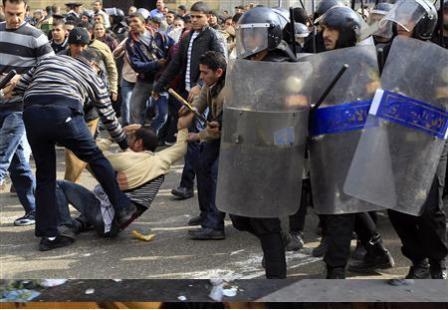CAIRO, (Reuters) – Egyptian President Hosni Mubarak refused today to bow to demands that he resign, after ordering troops and tanks into cities in an attempt to quell an explosion of street protest against his 30-year rule.
Mubarak dismissed his government and called for national dialogue to avert chaos following a day of battles between police and protesters angry over poverty and political repression.
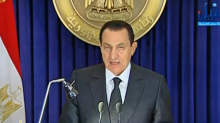
The unprecedented unrest has sent shock waves through the Middle East, and unsettled global financial markets yesterday.
Shortly after midnight, the army took control of Cairo’s central Tahrir Square, which had been the focus for thousands of protesters trying to force their way to parliament.
More than 20 military vehicles moved into the square, blanketing the area. Protesters, who had earlier been fired at with teargas and rubber bullets, fled into side streets leaving the square empty except for the military.
“It is not by setting fire and by attacking private and public property that we achieve the aspirations of Egypt and its sons, but they will be achieved through dialogue, awareness and effort,” said Mubarak, in his first public appearance, on state television, since unrest broke out four days ago.
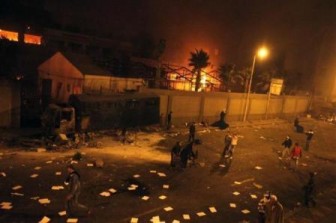
Shots were heard in the evening near parliament and the headquarters of the ruling National Democratic Party was in flames, the blaze lighting up the night sky.
Mubarak said he was dismissing his government — a move unlikely to placate many of the thousands who defied a nighttime curfew after a day of running battles with police.
The president made clear he had no intention to resign over the protests, triggered by the overthrow two weeks ago of Tunisian President Zine al-Abidine Ben Al Ben Ali after demonstrations over similar issues of poverty and liberty.
“There will be new steps towards democracy and freedoms and new steps to face unemployment and increase the standard of living and services, and there will be new steps to help the poor and those with limited income,” he said.
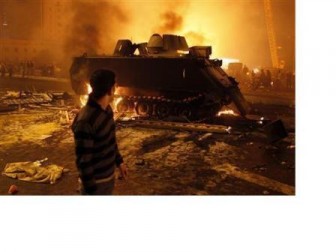
“There is a fine line between freedom and chaos and I lean towards freedom for the people in expressing their opinions as much as I hold on to the need to maintain Egypt’s safety and stability,” Mubarak said.
REMINISCENT OF TUNISIA
“Mubarak is showing he is still there for now and he is trying to deflect some of the force of the process away from himself by sacking the Cabinet. In some ways, it is reminiscent of what Ben Ali did in Tunisia before he was forced out,” Anthony Skinner, Associate Director of political risk consultancy Maplecroft, said.
“We will have to see how people react but I don’t think it will be enough at all.
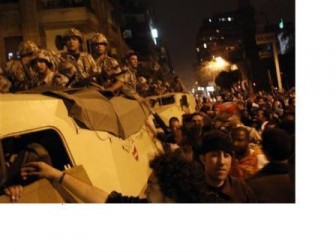
I wouldn’t want to put a number on his chances of survival — we really are in uncharted territory.”
Markets were hit by the uncertainty. U.S. stocks suffered their biggest one-day loss in nearly six months, crude oil prices surged and the dollar and U.S. Treasury debt gained as investors looked to safe havens.
“I think the next two to three weeks, the crisis in Egypt and potentially across the Middle East, might be an excuse for a big selloff of 5 to 10 percent,” said Keith Wirtz, president and chief investment officer at Fifth Third Asset Management in Cincinnati, Ohio.
Medical sources said at least five protesters had been killed and 1,030 wounded in Cairo on a day that saw security forces using rubber bullets, tear gas and water cannon to disperse crowds. Thirteen were killed in Suez and six in Alexandria.
Many protesters are young men and women. Two thirds of Egypt’s 80 million people are below 30 and many have no jobs. About 40 percent of Egyptians live on less than $2 a day.
Elections were due to be held in September and until now few had doubted that Mubarak would remain in control or bring in a successor in the shape of his 47-year-old son Gamal.
Father and son deny that Gamal is being groomed for the job.
Obama urges Mubarak to enact reforms
Following is the text of U.S. President Barack Obama’s statement on the situation in Egypt last evening.
“Good evening, everybody.
“My administration has been closely monitoring the situation in Egypt, and I know that we will be learning more tomorrow when day breaks. As the situation continues to unfold, our first concern is preventing injury or loss of life. So I want to be very clear in calling upon the Egyptian authorities to refrain from any violence against peaceful protesters.
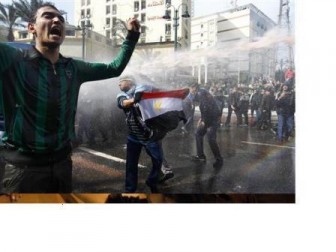
“The people of Egypt have rights that are universal. That includes the right to peaceful assembly and association, the right to free speech and the ability to determine their own destiny. These are human rights and the United States will stand up for them everywhere.
“I also call upon the Egyptian government to reverse the actions that they’ve taken to interfere with access to the Internet, to cellphone service and to social networks that do so much to connect people in the 21st century.
“At the same time, those protesting in the streets have a responsibility to express themselves peacefully. Violence and destruction will not lead to the reforms they seek.
“Now going forward this moment of volatility has to be turned into a moment of promise. The United States has a close partnership with Egypt and we’ve cooperated on many issues including working together to advance a more peaceful region.
“But we’ve also been clear that there must be reform: political, social and economic reforms that meet the aspirations of the Egyptian people. In the absence of these reforms, grievances have built up over time.
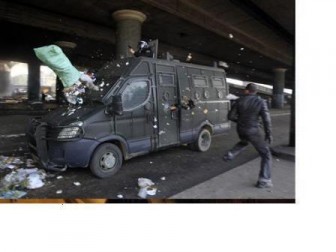
“When President Mubarak addressed the Egyptian people tonight, he pledged a better democracy and greater economic opportunity. I just spoke to him after his speech and I told him he has a responsibility to give meaning to those words, to take concrete steps and actions that deliver on that promise. Violence will not address the grievances of the Egyptian people and suppressing ideas never succeeds in making them go away.
“What’s needed now are concrete steps that advance the rights of the Egyptian people, a meaningful dialogue between the government and its citizens and a path of political change that leads to a future of greater freedom and greater opportunity and justice for the Egyptian people.
“Now ultimately the future of Egypt will be determined by the Egyptian people and I believe the Egyptian people want the same things that we all want, a better life for ourselves and our children and a government that is fair and just and responsive.
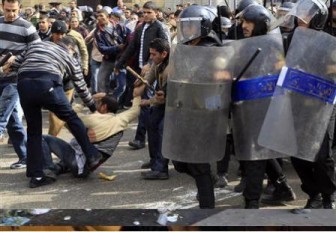
“Put simply, the Egyptian people want a future that befits the heirs to a great and ancient civilization. The United States always will be a partner in pursuit of that future and we are committed to working with the Egyptian government and the Egyptian people, all quarters, to achieve it.
“Around the world, governments have an obligation to respond to their citizens. That’s true here in the Untied States, that’s true in Asia, it is true in Europe, it’s true in Africa, it’s certainly true in the Arab world, where a new generation of citizens has the right to be heard.
“When I was in Cairo, shortly after I was elected president, I said that all governments must maintain power through consent, not coercion. That is the single standard by which the people of Egypt will achieve the future they deserves.
“Surely there will be difficult days to come but the United States will continue to stand up for the rights of the Egyptian people and work with their government in pursuit of a future that is more just, more free and more hopeful.
“Thank you very much.”
Q+A-What now after Egypt’s protests?
Following are some questions and answers
* HAS MUBARAK DONE ENOUGH TO SEND PROTESTERS HOME?
Protesters were still on the streets after Mubarak announced that he would sack his cabinet, and the crowds remained defiant.
“It was never about the government, by God. It is you (Mubarak) who has to go! What you have done to the people is enough!” said one protester.
Mubarak has delivered a tough message and shown his resolve to stay. The message involved a big stick and a modest carrot. The stick came in the form of tanks rattling into the capital and other cities. The carrot was the acknowledgement in his TV address of the economic frustrations many Egyptians have, the promise of steps to help the poorest in particular and vague pledges about political reform.
Many Egyptians may believe they have heard such promises before. But protesters who venture out now will find themselves looking down the barrel of the gun of a tank, rather than facing down a riot truck’s water cannon.
While the protest was driven by Web-savvy, more educated, middle class Egyptians, it drew a far broader range of the population onto the street as momentum built. The poor who depend on state food subsidies may want to see if Mubarak’s promises of help materialise before testing how ready the army is to act on its implicit threat of force.
“We will have to see how people react but I don’t think it will be enough at all. I wouldn’t want to put a number on his chances of survival — we really are in uncharted territory,” said Anthony Skinner, associate director at political risk consultancy Maplecroft.
* WHAT DOES TUNISIA TELL US?
When Tunisian President Zine al-Abidine Ben Ali sacked his government and promised early elections, the concessions marked the end for his rule: he made the pledge in the morning and had fled by evening. But he was not able to get the army’s backing to do the job of controlling the protesters which the police had failed to do.
Mubarak, a former air force commander, has so far shown he is still firmly in control of the army, the most powerful force in the country. It will take hardy protesters to challenge that.
“In some ways, it is reminiscent of what Ben Ali did in Tunisia before he was forced out, that he also sacked his cabinet, but he then had to stand down when it became clear the army would not fire on demonstrators. We still don’t really know where the army in Egypt stands at present,” said Skinner.
* WHAT DOES IT MEAN FOR EGYPTIAN MARKETS AND ECONOMY?
Egyptian markets were wobbly in the wake of Tunisia, even before the protests flared up in Egypt. When protests erupted in Egypt on Tuesday, shares tumbled in the worst one-day fall in Egypt’s main benchmark’s <.EGX30> history and the Egypt pound plunged to six-year lows. Egypt’s financial markets were closed on Friday, the Egyptian weekend. The markets will be in for a rough ride when they reopen on Sunday.
Foreign investors have poured billions of dollars of cash into Egypt since the appointment in 2004 of the current cabinet, which slashed taxes and customs duties. That has helped deliver sturdy growth in recent years, now running at about 6 percent, but the poor complain that the benefits are not trickling down.
Investors will worry over who will now take over key economic portfolios and whether reforms will be reversed.
“Egypt’s future is bigger and more serious than to be left for economists alone,” Mubarak said in his address after the protests.

